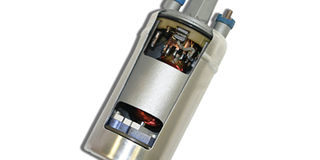Prime
Every car’s heart; the fuel pump

Along with the freedom that comes with owning a car is the responsibility to keep the engine and other components in good working order. Unfortunately, even with the best of care, some engine parts will eventually require replacement.
The fuel pump is a prime example. Ask yourself, as a car owner, when you last thought about the fuel pump. Fuel pump problems are usually characteristic of older cars, but then again what’s an old car as most people consider the number plate range of a car to determine its freshness? A 1996 year-of-manufacture car with a UAN series plate shall be way newer than a 2001 year-of-manufacture car with a UAE plate.
Why do fuel pumps fail? There are a number of reasons, top being contamination, overheating and the gears in the fuel pump wearing out over time. Rust, debris and dirt are three common particles that can somehow enter the fuel tank and get fed towards or through the in-tank fuel filter and possibly into the fuel pump.
These particles clog up your fuel pumps filter, making it work harder to pump fuel. This causes stress and accelerated wear on the several small components inside the fuel pump, eventually leading to fuel pump failure. Your car’s fuel pump relies on fuel running through it to cool and lubricate it. Starving your fuel pump of fuel can cause it to fail prematurely.
Fuel pumps serve the same purpose in a car as the heart in a human body. It facilitates the supply of fuel to the required sections in a car and is one of the integral parts of a car assembly. Symptoms of a bad fuel pump are an immediate cause of concern, as it can adversely affect the working and long-term efficiency of your car.
One of the early warning signs of a bad fuel pump is the development of a high-pitched sound when the engine is first engaged. Different types of fuel pumps will make slightly different sounds. Regardless of the exact sound emitted, it is important to get your car to a mechanic quickly. The fuel pump is not likely to keep functioning much longer.
Sudden trouble accelerating or delayed acceleration can also be a sign that you have a bad fuel pump. Because the fuel pump is not supplying an even flow of fuel, the rest of the engine cannot perform at peak level. As you press down the accelerator, the car begins to take off and then shortly loses power before regaining it and taking off.
While it is possible that the problem is with the filter, your best bet is to have the fuel pump checked as soon as possible, so the uneven acceleration does not have a chance to progress on to shutting off while on the road. If the fuel pump has completely failed, the car will crank but will not start. Sometimes the car runs intermittently and unpredictably turns off, but restarts later. Trouble going uphill is another indicator of a failing pump. The car loses power when climbing hills or when needing additional power, such as during acceleration.
One way to prolong the life of your fuel pump is to make sure you never run out of fuel, well, at least not very often. Always keep enough fuel in the tank for the pump to be submerged in fuel. It is also a good idea to make sure the filter is replaced on a regular basis.
Failure to replace a bad fuel pump in a timely manner may cause other car parts to work harder. This will only lead to even more costly repairs that must be made as well as increase the chances of a breakdown at the worst possible moment.




